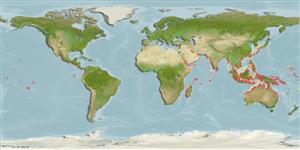Пластиножаберные (акулы и скаты) (sharks and rays) >
Myliobatiformes (Stingrays) >
Gymnuridae (Butterfly rays)
Etymology: Gymnura: Greek, gymnos = naked + Greek, oura = tail (Ref. 45335).
More on author: Shaw.
Environment: milieu / climate zone / depth range / distribution range
экология
морской демерсальный; пределы глубины ? - 80 m (Ref. 9773). Tropical
Indo-Pacific: Persian Gulf (Ref. 68964), Red Sea to French Polynesia, north to Japan. Also reported from Persian Gulf (Ref. 96002).
Length at first maturity / Size / Вес / Возраст
Maturity: Lm 48.0 range ? - ? cm
Max length : 250 cm WD самец/пол неопределен; (Ref. 30573)
Ovoviviparous (Ref. 50449). Caught often in demersal trawls, and occasionally by trammel net. Utilized for its meat, but of limited value due to its typically small size (Ref. 58048).
Exhibit ovoviparity (aplacental viviparity), with embryos feeding initially on yolk, then receiving additional nourishment from the mother by indirect absorption of uterine fluid enriched with mucus, fat or protein through specialised structures (Ref. 50449). Distinct pairing with embrace (Ref. 205). Gives birth to litters of up to 7 pups; born at 24-26 cm WD (Ref. 58048).
Sommer, C., W. Schneider and J.-M. Poutiers, 1996. FAO species identification field guide for fishery purposes. The living marine resources of Somalia. FAO, Rome. 376 p. (Ref. 30573)
Статус Красного Списка МСОП (Ref. 130435: Version 2024-2)
Угроза для людей
Harmless
Использование человеком
рыболовство: коммерческий
дополнительная информация
инструменты
Специальные отчеты
Скачать в формате XML
ресурсы в Интернет
Estimates based on models
Preferred temperature (Ref.
123201): 25.2 - 29.2, mean 28.5 °C (based on 2718 cells).
Phylogenetic diversity index (Ref.
82804): PD
50 = 0.5000 [Uniqueness, from 0.5 = low to 2.0 = high].
Bayesian length-weight: a=0.00617 (0.00391 - 0.00973), b=3.06 (2.92 - 3.20), in cm total length, based on LWR estimates for this species & (Sub)family-body (Ref.
93245).
Trophic level (Ref.
69278): 3.8 ±0.59 se; based on food items.
устойчивость к внешним воздействиям (Ref.
120179): очень низкий, минимальное время удвоения популяции более 14 лет (Fec=1-6).
Fishing Vulnerability (Ref.
59153): Moderate vulnerability (43 of 100).
Nutrients (Ref.
124155): Calcium = 18.6 [5.1, 96.5] mg/100g; Iron = 0.633 [0.154, 1.772] mg/100g; Protein = 22.5 [19.0, 25.4] %; Omega3 = 0.159 [0.044, 0.512] g/100g; Selenium = 54.2 [15.2, 177.9] μg/100g; VitaminA = 9.18 [3.08, 26.74] μg/100g; Zinc = 0.584 [0.276, 1.078] mg/100g (wet weight);
